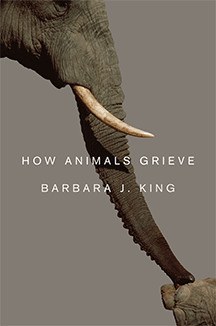By Benjamin Franklin Martin
What is the cause when horses circle the body or grave of a stable mate, when elephants visit the bones of a herd member and touch the tusks with their trunks, when female dolphins, killer whales, monkeys, chimpanzees, and gorillas carry the body of a dead offspring for days, when cats keen at the loss of litter mates, when dogs wait for their companions, canine and human, long after they are gone forever? The traditional answers are mere curiosity or distress at a disruption in their routine. Any suggestion that they might be mourning is dismissed as “anthropomorphism,” the attribution of human behavior to animals.
Barbara J. King dissents emphatically. She presents an array of scientific studies and anecdotal accounts, some impressive, others suggestive, to assert that animals do indeed grieve, and so “trample an assumed animal-human boundary.” She begins with the simple notion that grief is born from love. Certainly, animals display an attraction to other animals and often to humans. They demonstrate this love through interactions that go far beyond any survival-based purposes. If the interaction ceases through death or dislocation, they will suffer in visible fashion through refusal to eat, plaintive calls, and actions that convey depression.
King, an anthropologist, all but erases the animal-human boundary, asking, “Do animals read bones on the ground like we read obituaries?” before insisting, “We are social animals who evolved from other social animals who grieve.” She argues that the reaction to loss, especially death, is such a stressful matter to all higher animals that it must have a common biological origin. Her one concession to human emotions, as much a curse as a blessing, is that “only we look far ahead with dread, or relief, or a mix of the two, aware that death is coming.” How Animals Grieve is convincing and profoundly moving.
Benjamin Franklin Martin (ΦΒΚ, Davidson College, 1969) is the Price Professor of History at Louisiana State University and a resident member of the Beta of Louisiana chapter of Phi Beta Kappa.




